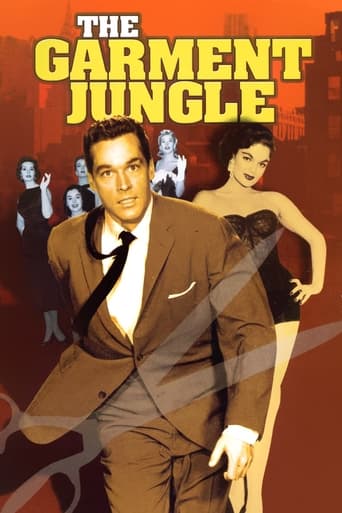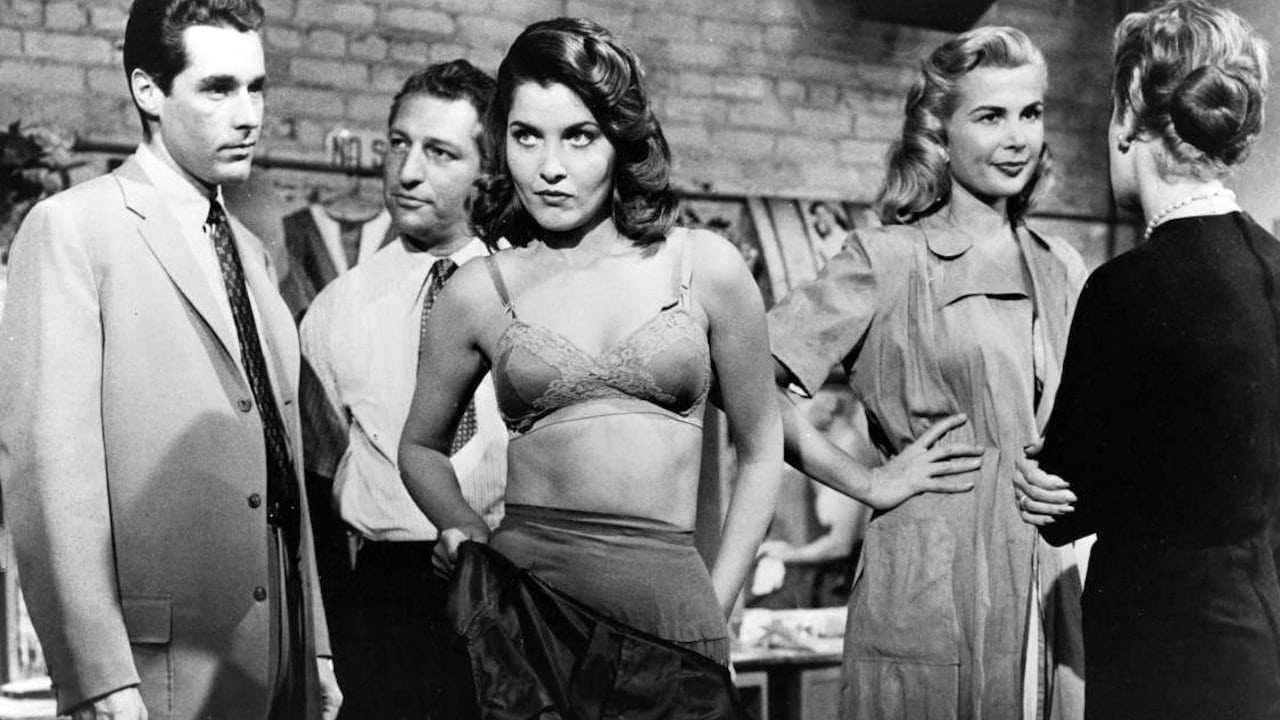bkoganbing
Lee J. Cobb in a further attempt to buttress his reputation after being a friendly witness at the House Un-American Activities Committee chose yet another labor story in The Garment Jungle. Cobb plays a factory owner of an unorganized shop in the garment center who has uneasy and unofficial partnership with racketeer Richard Boone. Boone provides the muscle to keep out organizers from the International Ladies Garment Workers Union from Cobb's place of business.After the death of Robert Ellenstein who was Cobb's partner, Cobb's son Kerwin Matthews who had not taken an interest in the business up till now is shocked that Cobb is in deep with someone like Boone. Matthews then takes up the mantle of crusader.Which really doesn't fit him well. I found it hard to believe that Matthews suspected nothing up to that time. Probably in real life he would just make sure he didn't know.Boone is his usual good self, but the outstanding performance in the film is a young Robert Loggia who is passionate and dynamic in his role as an ILGWU organizer. God bless man who some 60 years later is still going strong and who is never bad in anything he does. Also standing out are the two females in substantial roles, Gia Scala as Loggia's wife and Valerie French as a buyer who has a thing going with Cobb.I don't think it was an accident that Lee J. Cobb appeared in this role. The ILGWU as a union fought both Communists and racketeers both from taking over the union. The ILGWU president David Dubinsky was a veteran of those wars. He probably understood what Cobb went through in making that decision to be a friendly witness and this film I have no doubt was under ILGWU strict auspices.One thing that was very much in keeping with the times was Loggia's role as an organizer. The rank and file of the ILGWU was passing from a Jewish base to more Latinos, both men and women. Loggia's role as an organizer of Latino background was spot on.Despite some flaws and it's not in the same class as On The Waterfront, The Garment Jungle is a good film with some strong performances by a few players.
dougdoepke
No need to recap the plot. Those who compare this racketeering movie with The Phenix City Story (1955) are making an apt comparison. The problem for this film, unlike Karlson's, is that The Garment Jungle has too many flaws to succeed as a minor gem. At its core, it's a good gritty film with a gutsy screenplay and a powerhouse selection of featured players. But, the end result is compromised by two key flaws. No matter how you cut it, Kerwin Mathews is simply not up to the challenge of his pivotal role as the conscionable son. Unlike Richard Kiley of Phenix Story who must go through similar changes, Mathew's bland demeanor remains the same even after he's committed to fighting corruption and his father. He has basically one emotionless expression for every occasion. The words are there, but crucially not the required feeling. Unfortunately, he has extended scenes with three very strong personalities, Cobb, Loggia, and Boone, and except for the camera, you might even forget he's there. It's a big emotional hole that carves a vacuum right through the picture's middle, detracting from the overall impact. In Mathew's defense, it is his first starring role, and it is a demanding part. Clearly, he's got the looks but not the skills; at the same time, he was probably wise to make a career of undemanding special- effects movies. Still and all, consider how much stronger the impact would be were the movie's ordeals reflected in Mitchell Jr.'s changed character as he goes through them.Second, it certainly does matter who directed the scenes. Pulling Robert Aldrich off the film was a major blunder in terms of overall quality. Like fellow noir specialists Phil Karlson and Anthony Mann, Aldrich doesn't just show us violence, he makes us feel it. Consider the brutal undercurrent running through three key scenes—the elevator crash, Tulio's murder, and the union meeting. The audience doesn't just see the violence or threats of violence, we feel them with a palpable sense of dread. I suspect this is a talent that can't be taught; instead, it comes from a sensibility deeper than mere technique. Now, contrast those scenes with the utterly pedestrian last 10 minutes—the fist-fight with Boone, the cops coming in at just the right moment. These are clichés without feeling or undercurrent, and I would bet the house that Sherman directed those very forgettable episodes. I also suspect Sherman, a "woman's" director, was brought in to soften the ending into something more conventional and play up Scala's part, and especially French's otherwise non-essential role. Nonetheless, those last 10 minutes contrast sharply with the noir sensibility that is unmistakably Aldrich's.At the same time, I wonder whose idea it was to have dad Mitchell's (Cobb) murder occur off-camera. To me that should be a dramatic highpoint of the story, where Mitchell's corrupt past catches up despite his good efforts at reform. Cobb could certainly have transformed such a scene into a vivid emotional climax that would have added a memorably tragic touch. However, the way it's done off-camera produces no impact at all. My guess is that the studio was leery of adding another violent scene to those already in place; after all, this was the period of the Production Code with its strictures on what could be said, what could be shown.None of this is to deny that Jungle remains a riveting social-conscience film with an unusually fine New York cast, a gutsy script, and some gritty street photography. But much of that overall impact, I believe, is due to the outstanding noir sensibility of Robert Aldrich. More importantly, had Columbia Studio left him alone and in charge, the movie could easily have become a classic along the lines of his Kiss Me Deadly instead of the unevenly good film it finally is.
jimmccool
I was lucky enough to see a VHS-transfer copy of this, and despite the poor quality, I can recommend this as a top-notch Crime/Mob/Racket thriller. Not exactly noir, but shares many many similar qualities - fast pace, seedy NY locations, opening voice-over etc. Think 'Phenix City Story' and you won't go far wrong - though this is actually even better than that. As usual, Lee J. Cobb is outstanding. And it seems strange to see Cobb here, in such an unashamedly 'leftish' film, after the trouble he had with HUAC earlier in the decade. There's not one mention of the 'C' word, though "anti-communism" would undoubtedly have been the cover for the Mob's anti-union activities... This is only one of very few films I can think of from Hollywood with a pro-Union message - and I doubt if it could even have been made during the height of the McCarthyite witch-hunt. Find it, watch it, enjoy it. And then join your local trade union, organise to keep the mobsters and agitators out.
weghalbert
This is a over looked little gem here. The cast is excellent from top to bottom, even the weak link here Kerwin Mathews is better than most of his other roles in films. Lee J. Cobb tackles his role with gusto and scores a home run as the tough hardheaded father/boss.The always excellent Richard Boone shines as the ruthless mob enforcer. Lots of Broadway stage talent on display here. Robert Loggia makes the most of his role in his film debut, Joseph Wiseman's character reminds one of his role as Charley Gennini in Detective Story. Valerie French who did as many Broadway plays as movies is effective in her minor role. The always reliable Harold J. Stone as the shop foreman (Harold grew up in Yiddish theatre and made his Broadway debut in 1939). Even the smaller roles have nice surprises. The wonderful character actor Willis Bouchey (a stable of John Ford in his films, best remembered for his president of the court-martial in Sergeant Rutledge )as a union president. Celia Lovsky (the ex wife of Peter Lorre, and character actress in over 200 TV shows, 40 films),is wasted as the Grandmother. Don't blink or you will miss Joanna Barnes (only one year away from playing the memorable WASP Gloria Upson in Auntie Mame) in her film debut. She only has two lines,but she is so close she is almost kissing the camera. And some very familiar acting thugs doing their nasty business with flair.... And last but not least we come to Gia Scala as the feisty Italian Theresa Renata (Gia was half Sicilian from her father and 1/2 Irish , who left Italy for New york City to eventually study with Stella Adler and the Actors Studio) Gia shows so much promise here. Everyone knows her for Anna in The Guns of Navarone, and she was very good in a handful of other roles in the 50s. Sadly Gia took to the bottle after her The Guns of Navarone role and her career nosedived quickly. ( Well after all she was half Irish) One only has to see how badly her looks and talent had eroded in her 3rd to last acting role in the TV show "Tarzan" with Ron Ely. Toward the end of the show,she has scenes where she is not even looking toward the camera,perhaps having to do a voice over,(unable to remember her lines) and the ending is strange ,like she did not even show up for filming and they had to patch together a ending to the show, with no Gia on the set. (Gia died of a overdose of alcohol and sleeping pills suicide in 1972 after unsuccessful attempts in 1958, when her Mother died, and 1971 ,after learning her ex husband married Barbara Anderson less than a year after their divorce ) A sad end to a very promising career. Speaking of Tarzan, that's Eve Brent as the Receptionist, the future Jane in two Gordon Scott "Tarzan" films.The Garment Jungle is rare film , but well worth the effort to track it down.


 AD
AD



